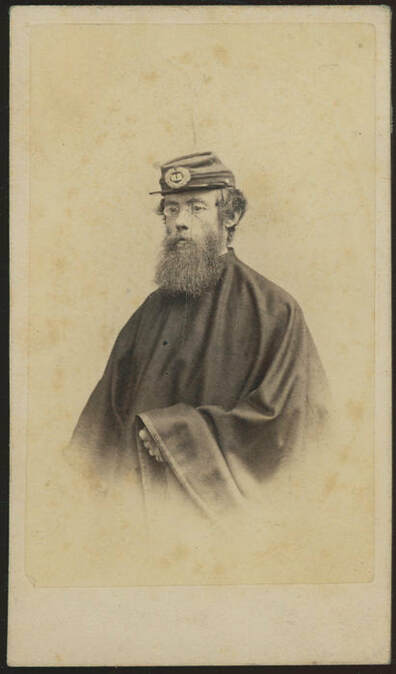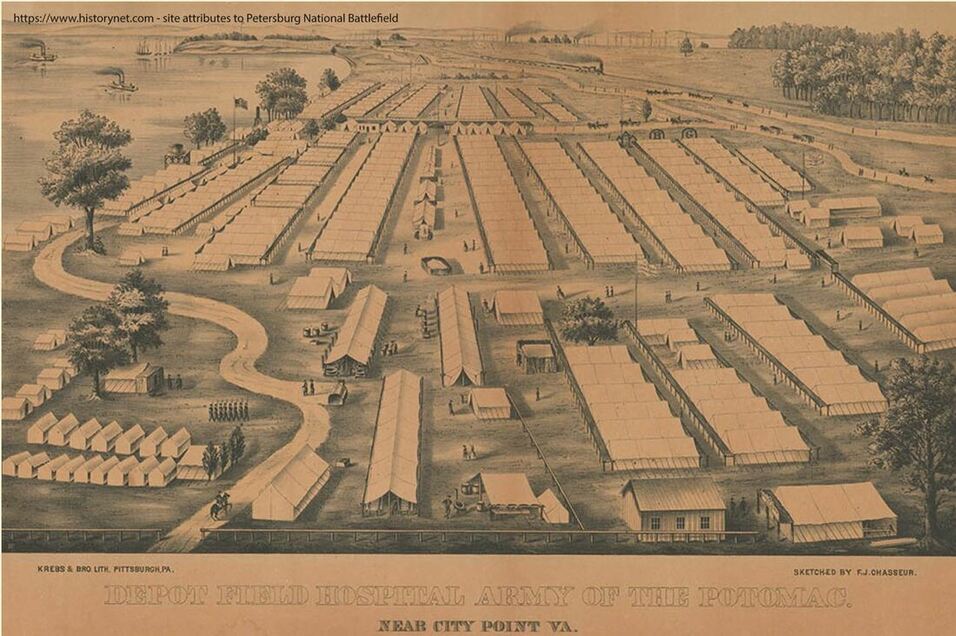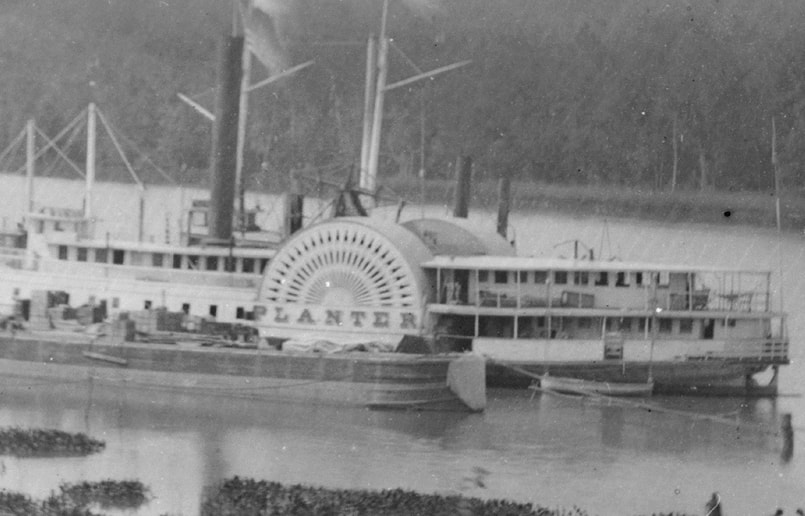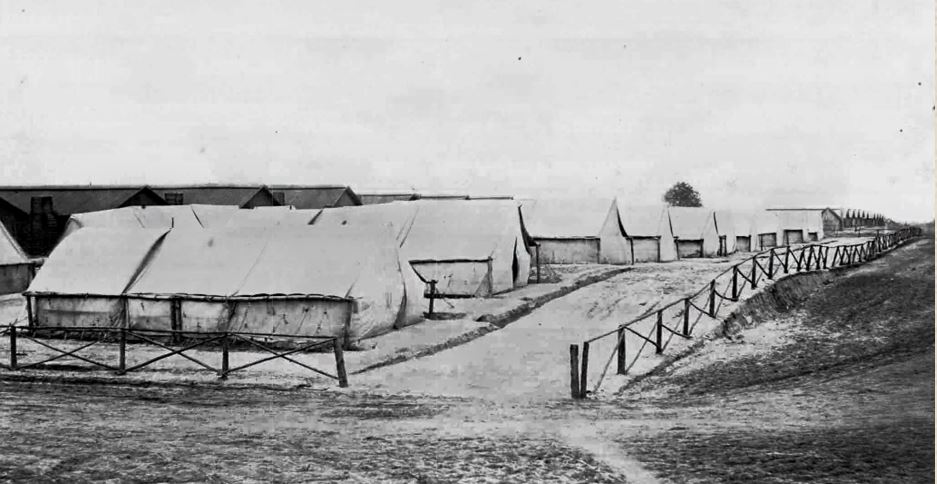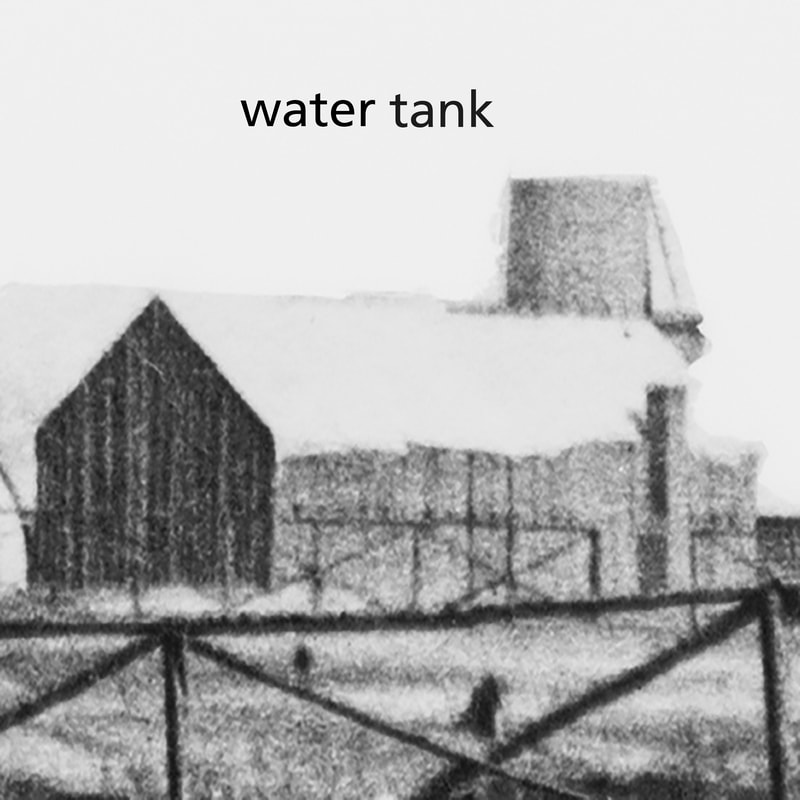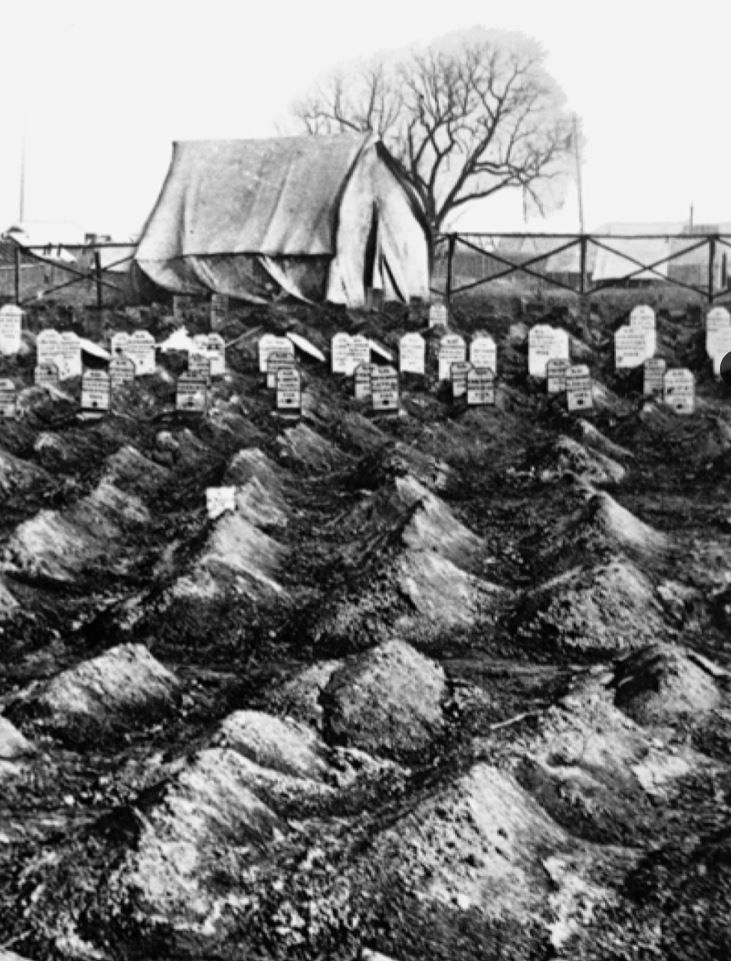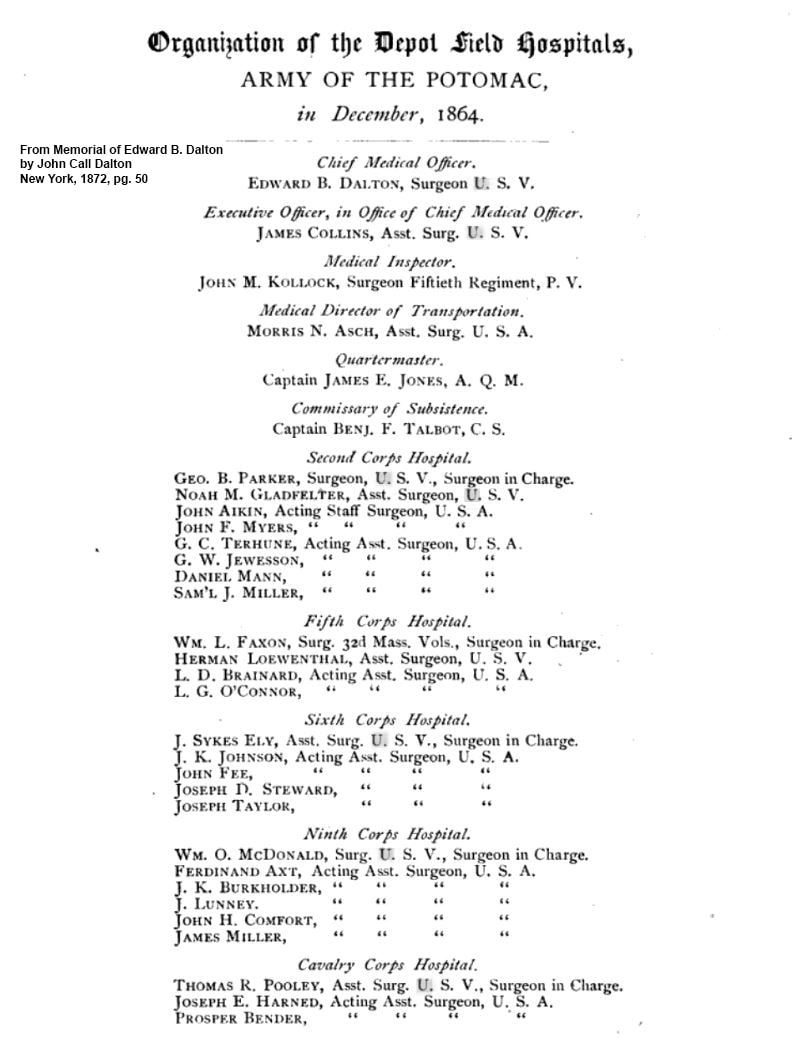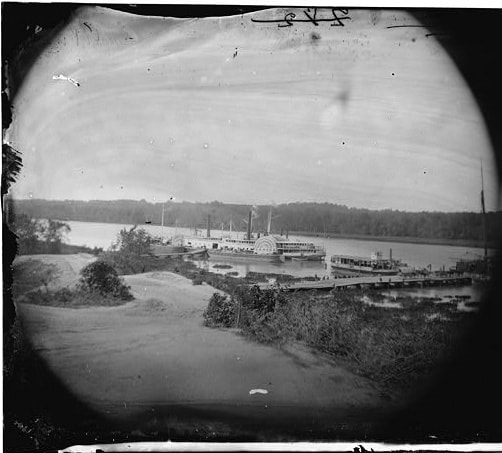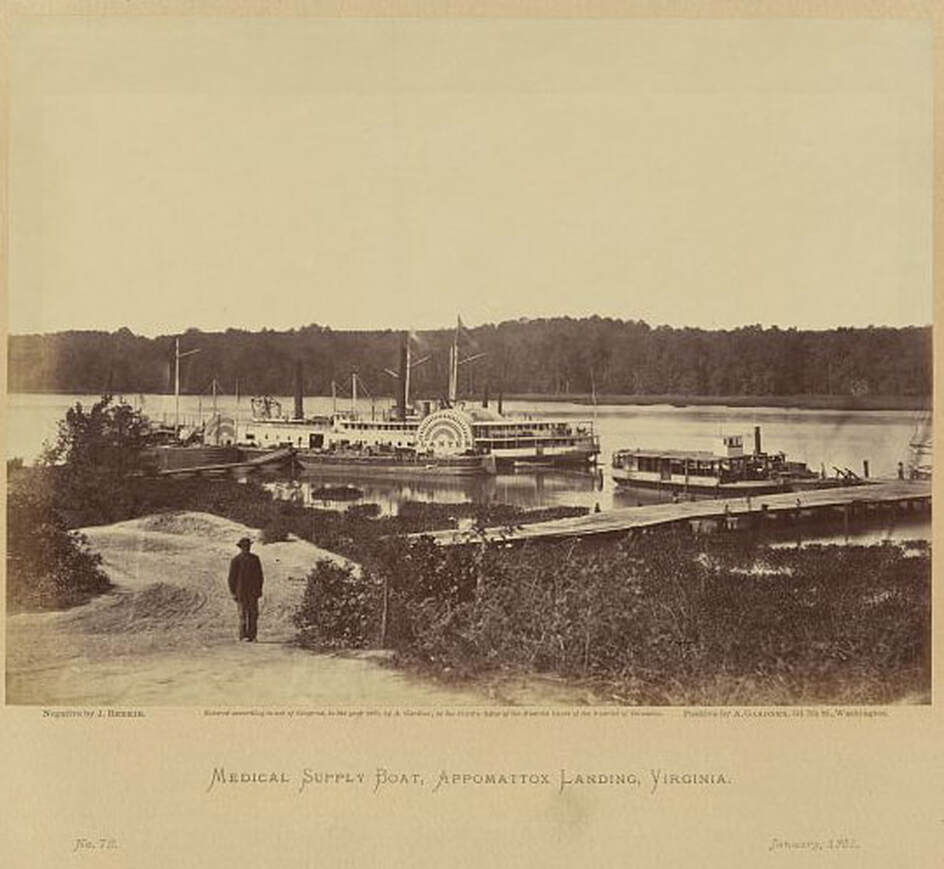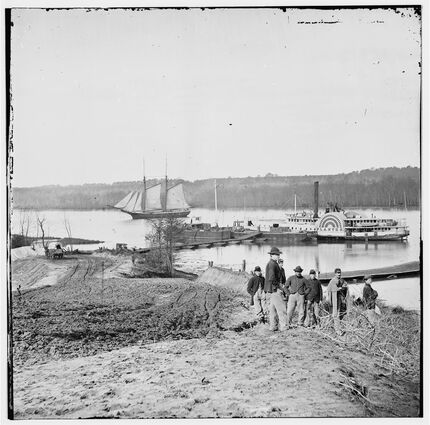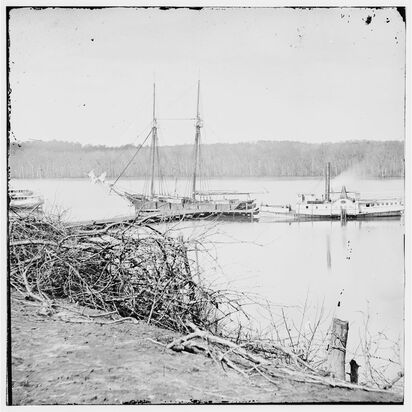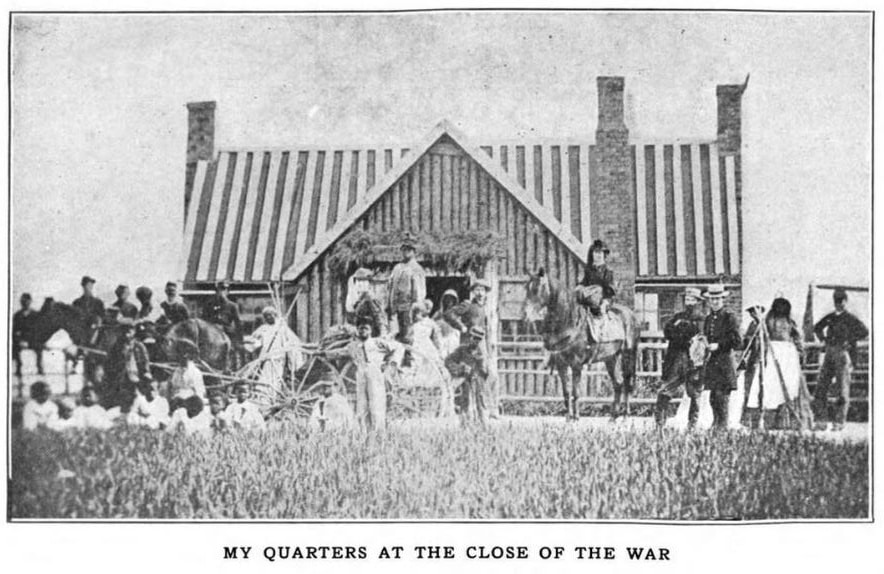Depot Field Hospital at City Point: Report of Surgeon Edward Barry Dalton
|
Depot Field Hospital, Army of the Potomac,
City Point, Va., December [31], 1864. SIR: "On the morning of the 14th [June] a large proportion of the medical officers, the commissary, and the quartermaster, together with the purveying department and most of the hospital proper, started down the Pamunkey en route for Jamestown Island, in the James River, which had been designated in your letter of the 12th as the probable rendezvous until further orders. A temporary delay was occasioned at Yorktown by the great reluctance of the captains of the purveying steamers Planter, Farmer, and Hugh Jenkins to proceed. Their objections were, however, overruled and we reached Jamestown Island on the afternoon of the 15th. Here orders were received through you to proceed to City Point and there establish the hospital depot." On the 16th, upon reaching the pontoon bridge near Fort Powhatan, we were delayed by the crossing of cavalry and the cattle. Surgeon [Alonzo J.] Phelps, however, succeeded in getting above the bridge by means of a small boat and thence by tug to City Point, where he selected a site for the hospital. We finally reached City Point on the 18th, just as a train of ambulances arrived, loaded with wounded from the assault upon Petersburg. These were at once attended to, and transportation to Washington procured for them, hospital transports being loaned for the purpose by Surgeon McCormick, U. S. Army, medical director of the Department of Virginia and North Carolina. |
SITE SELECTION AND DEPLOYMENT
"The hospital property was at once unloaded and conveyed to the site selected and there put in readiness as rapidly as possible for the reception of wounded, who still continued to come in in large numbers. This site, which is the one still occupied, is located to the south of the James River, one mile from City Point toward Petersburg. It is situated upon a broad plain extending from the Petersburg pike to the high bluffs overlooking the basin of the Appomattox, just at the junction of the latter river with the James. The plan of the encampment, which still remains essentially unaltered, was mainly devised by Doctor Phelps. Some irregularities occurred in its execution, in consequence of the embarrassment of laying out the camp and erecting tents at the same time that the presence of wounded called constantly for professional labor."
"The hospital property was at once unloaded and conveyed to the site selected and there put in readiness as rapidly as possible for the reception of wounded, who still continued to come in in large numbers. This site, which is the one still occupied, is located to the south of the James River, one mile from City Point toward Petersburg. It is situated upon a broad plain extending from the Petersburg pike to the high bluffs overlooking the basin of the Appomattox, just at the junction of the latter river with the James. The plan of the encampment, which still remains essentially unaltered, was mainly devised by Doctor Phelps. Some irregularities occurred in its execution, in consequence of the embarrassment of laying out the camp and erecting tents at the same time that the presence of wounded called constantly for professional labor."
|
WHARVES AND MEDICAL TRANSPORT SHIPS
"By means of pontoons two temporary wharves were soon constructed at a convenient point a short distance up the Appomattox. These were for the exclusive use of the hospital, and were used respectively for the landing and issuing of supplies and for transferring wounded to the hospital transports. The services of the transports were immediately, and for a time, constantly in demand. Two of these, the Connecticut and State of Maine, were of sufficiently light draught to be able to come alongside the wharf. The De Molay could reach the mouth of the Appomattox and was there loaded by means of lighters. The Atlantic, Baltic, and Western Metropolis came no farther than Fort Monroe or Newport News and were there loaded by transfer from the Connecticut and State of Maine. All rendered most efficient service, especially the Connecticut, which has been throughout the campaign remarkable for the promptness and energy displayed in her management." |
EQUIPAGE
"The purveying department met all necessary demands with promptness and liberality. Nothing really essential to the care of the wounded was wanting. Bedsacks and blankets were supplied without stint, although for a time bedsteads were dispensed with, excepting in the severer cases, a large proportion of the patients being placed upon sacks amply filled with straw and arranged upon the ground beneath the tents. None were without shelter. Drugs and dressings in abundance, hospital stores, ice, and even delicacies were constantly issued; cooking stoves, caldrons, and portable ovens were on hand in sufficient quantity for any emergency. Requisitions received prompt and full attention at all times. But a short time elapsed before the arrival of an abundant supply of bedsteads, when sheets and pillow-cases were at once made use of in all cases where they could essentially add to the comfort of the patient."
"The purveying department met all necessary demands with promptness and liberality. Nothing really essential to the care of the wounded was wanting. Bedsacks and blankets were supplied without stint, although for a time bedsteads were dispensed with, excepting in the severer cases, a large proportion of the patients being placed upon sacks amply filled with straw and arranged upon the ground beneath the tents. None were without shelter. Drugs and dressings in abundance, hospital stores, ice, and even delicacies were constantly issued; cooking stoves, caldrons, and portable ovens were on hand in sufficient quantity for any emergency. Requisitions received prompt and full attention at all times. But a short time elapsed before the arrival of an abundant supply of bedsteads, when sheets and pillow-cases were at once made use of in all cases where they could essentially add to the comfort of the patient."
|
CAPACITY AND ORGANIZATION
"The capacity of the hospital was rapidly increased until it became capable of accommodating 10,000 patients. At first these were mainly wounded, but as the season advanced and the prolonged duty in the trenches told upon the men, the proportion of sick became greater. Each successive engagement would fill the beds with wounded, but these, especially the severely hurt, were sent north as rapidly as possible, while the sick, as a general rule, were removed only when the character of the case rendered a change of climate essential to recovery. The entire encampment now covers an area of some 200 acres and is composed of 1,200 hospital tents. The latter were originally pitched in groups composed of two tents and an intervening fly, and placed end to end. These groups are arranged in rows, side by side, divided by lateral interspaces of fifteen feet in width between the individual groups. The ends of the groups abut upon streets sixty feet wide, running parallel with the river and meeting at right angles a main avenue 180 feet in width, which extends from the verge of the bluft directly through the center of the camp to the Petersburg pike. Since the approach of cool weather an entire tent has been substituted for the intervening fly in each group." |
|
|
WATER SUPPLY
"Shortly after the establishment of the hospital at this point, works were constructed by the quartermaster for supplying the encampment with water. Two steam-engines of four horse-power each were placed at the foot of the bluff at the edge of the river, whence they force water into a tank capable of containing 6,000 gallons, which is raised thirty feet above the level of the bluff and supported upon a strong wooden trestle-work. From this tank a conducting pipe of two inches diameter descends to the ground and is then conducted at a depth of eighteen inches below the surface along the main avenue. At right angles to this main pipe smaller ones diverge at intervals and enter the various divisions of the hospital, where at the extremity of each pipe is a hydrant. These works, which were completed on the 6th of July, have proved entirely satisfactory. An abundance of river water was thus supplied for laundry, bathing, and other coarser purposes. Wells were dug in various parts of the hospital, and these, with numerous springs in the vicinity, afforded a plentiful supply for drinking and cooking." |
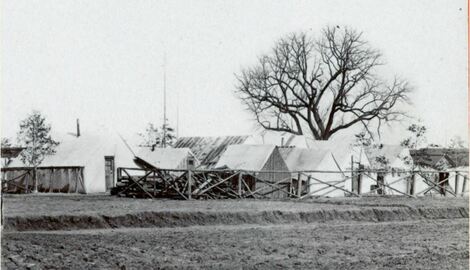 View of Hospital that highlights the drainage ditch that surrounded the compound. (Library of Congress LC 1s02811) .
View of Hospital that highlights the drainage ditch that surrounded the compound. (Library of Congress LC 1s02811) .
DUST CONTROL AND DRAINAGE
"For several weeks subsequent to the arrival at City Point no rain fell and the accumulation of dust became a source of the greatest discomfort. Bodies of troops and wagons were constantly passing along the main road, and the dust thus disturbed was borne in dense clouds over and through the camp, filling the tents and penetrating even the bedclothes. This matter was represented at the Surgeon-General's Office and sprinkling carts applied for. Eight of these were promptly sent down from Washington and were immediately and constantly made use of. They afforded great relief not only in subduing the dust but also in moderating the intense heat of the atmosphere. As an ad-ditional means high, broad bowers were built continuously along the ends of the tents on each side of the streets. For purposes of drainage each group of tents was surrounded by a trench eight inches in depth. From these trenches the water is conducted into ditches which run parallel to and on each side of the streets, and terminate by means of still larger ones in various irregular ravines with which the ground is broken and which descends rapidly to the river. This system has proved entirely effectual."
"For several weeks subsequent to the arrival at City Point no rain fell and the accumulation of dust became a source of the greatest discomfort. Bodies of troops and wagons were constantly passing along the main road, and the dust thus disturbed was borne in dense clouds over and through the camp, filling the tents and penetrating even the bedclothes. This matter was represented at the Surgeon-General's Office and sprinkling carts applied for. Eight of these were promptly sent down from Washington and were immediately and constantly made use of. They afforded great relief not only in subduing the dust but also in moderating the intense heat of the atmosphere. As an ad-ditional means high, broad bowers were built continuously along the ends of the tents on each side of the streets. For purposes of drainage each group of tents was surrounded by a trench eight inches in depth. From these trenches the water is conducted into ditches which run parallel to and on each side of the streets, and terminate by means of still larger ones in various irregular ravines with which the ground is broken and which descends rapidly to the river. This system has proved entirely effectual."
|
NUMBERS OF WOUNDED AND RECOVERY
"It is impossible, by merely quoting the register, to convey an accurate idea of the number of sick and wounded who have received attention in this hospital. At Fredericksburg, at White House, and still later at City Point, hundreds passed through under circumstances which rendered it impracticable to register their names or even to accurately estimate their number. These instances occurred during or immediately subsequent to an engagement, when the accumulation of wounded and the constant calls for professional labor sometimes made it necessary to transfer at once from the ambulances to the hospital transports. In fact, as I have already stated, so unremitting were the professional duties of the medical officers during the first fortnight at Fredericksburg, that it was impossible even to prepare morning reports, and it was not until the 16th of May that even a numerical report was attempted. From that date to the present daily reports have been forwarded, and they show that from the 16th of May, 1864, to October 31, 1864, there have been received into this hospital and retained here under treatment for at least forty-eight hours, 68,540 sick and wounded officers and men. Of these 51,313 have been transferred to the various U. S. general hospitals at the North, and 11,706 have been returned direct from this hospital to duty with their commands. One thousand five hundred and sixteen have died. A large number of the wounded had when received here already suffered amputation or other capital operations at the immediate front, while in a great many other cases similar interference was still necessary. The experience here has given the most convincing evidence in favor of primary operations in gunshot wounds." |
DISEASE AND RECOVERY
"The majority of the sick received during,the summer have suffered from dysentery, diarrhea, and malarial fevers. A small proportion of cases of typhoid fever have occurred and a very few, comparatively, of pneumonia and milder diseases of the chest. The manifestations of malarial influences have, as a general rule, been of a mild character, and evidently owing in great measure to the prolonged exposure and hard service to which the men have been subjected in the trenches. In fact, very many of these do not properly come under the head of either of the recognized classes of malarious fever, but were rather cases of a depressed condition not inaptly expressed by the term malarial malaise. A large proportion of these recovered rapidly and entirely under the influence of rest, cleanliness, and good nourishment, together with moderate administration of quinine and iron. A number of cases have arisen within the limits of the encampment, but not in sufficient number or of sufficient severity to impair the efficiency of the hospital or to throw any doubt upon the propriety of its establishment and continuance. On the contrary, the numbers who have recovered and been returned to duty within a few weeks after their admission, and without their removal to a distance from the seat of war, have proved this site a most eligible one."
"The majority of the sick received during,the summer have suffered from dysentery, diarrhea, and malarial fevers. A small proportion of cases of typhoid fever have occurred and a very few, comparatively, of pneumonia and milder diseases of the chest. The manifestations of malarial influences have, as a general rule, been of a mild character, and evidently owing in great measure to the prolonged exposure and hard service to which the men have been subjected in the trenches. In fact, very many of these do not properly come under the head of either of the recognized classes of malarious fever, but were rather cases of a depressed condition not inaptly expressed by the term malarial malaise. A large proportion of these recovered rapidly and entirely under the influence of rest, cleanliness, and good nourishment, together with moderate administration of quinine and iron. A number of cases have arisen within the limits of the encampment, but not in sufficient number or of sufficient severity to impair the efficiency of the hospital or to throw any doubt upon the propriety of its establishment and continuance. On the contrary, the numbers who have recovered and been returned to duty within a few weeks after their admission, and without their removal to a distance from the seat of war, have proved this site a most eligible one."
|
I am, sir, very respectfully, your obedient servant,
ED. B. DALTON, Surgeon, U. S. Volunteers, Chief Medical Officer. Bvt. Lieut. COL. T. A. McPARLIN, U. S. Army, Medical Director, Army of the Potomac |
Official Records, Armies, vol. 40, pt. 1, 269-272 |
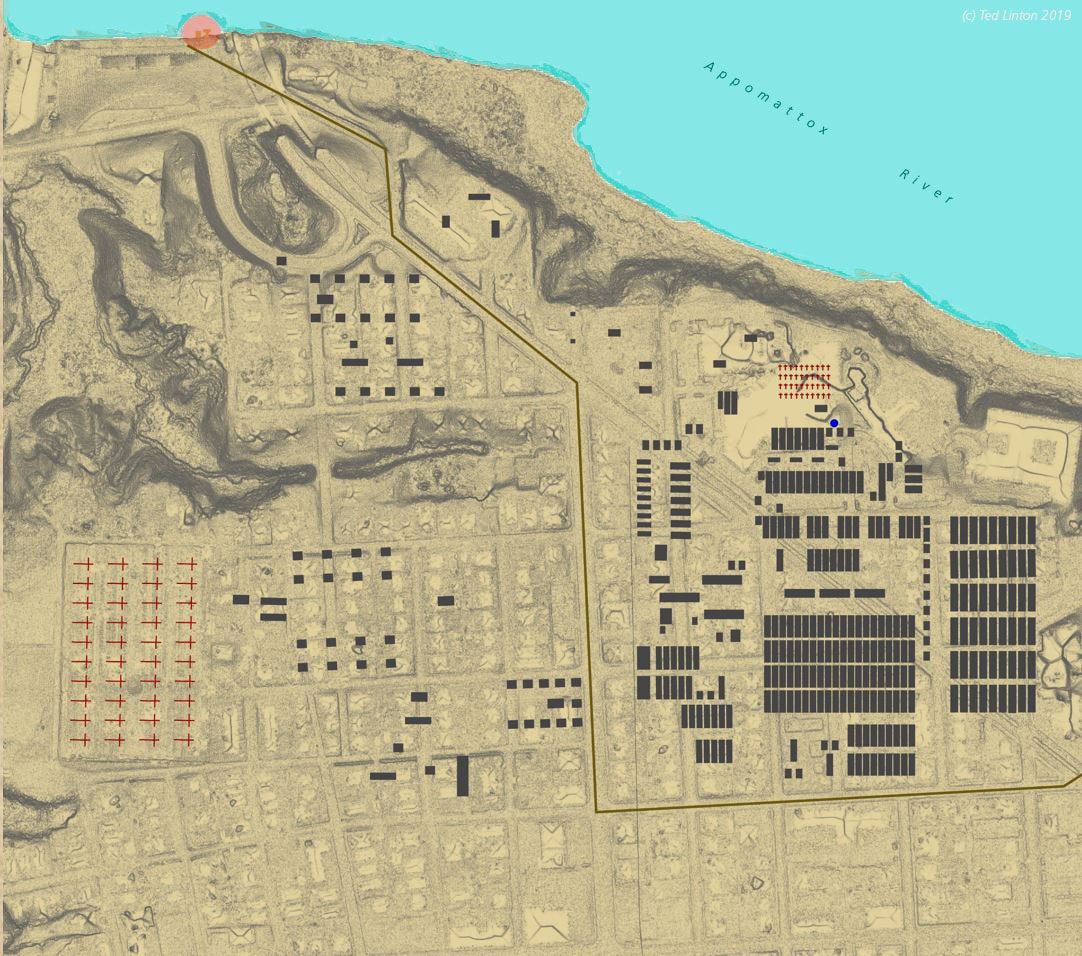
Map of Depot Hospital at City Point compiled and produced by Ted Linton. The dense rows of buildings on the right are the hospital proper (drawn to scale). The highlighted area at river's edge is the Hospital Wharf, at the location of the modern Hopewell City Marina. The area of small red crosses was original location of the hospital cemetery. The area of large red crosses is the current National Cemetery.
Activity at the City Point Hospital Wharf
A succession of four photographs depicting the "Planter" by John Reekie. Identifiable by the one negative that Gardner included in his sketchbook and attributed. These four images capture a sense of the shipping activity at the Hospital Wharf, City Point.
|
|
William Howell Reed, Hospital Life in the Army of the Potomac, W. B. Spencer, Boston 1881, page 93
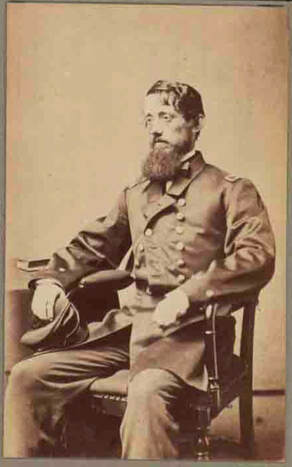 Another photo of Surgeon Edward B. Dalton from the MOLLUS Collection, volume 130, 6667.
Another photo of Surgeon Edward B. Dalton from the MOLLUS Collection, volume 130, 6667.
"Dr. Edward B. Dalton, the Medical Director, held his position since the commencement of~the campaign in May. At Fredericksburg, at White House, and through all the terrible emergencies of that experience, he had displayed eminent administrative ability; and this was now exercised at City Point. With every facility furnished by a magnificent army base, and after the experience of four years, he so adjusted the complicated machinery of hospital administration as to leave his mark upon the field hospital system, which, in the previous history of the war, had never been brought to such perfection. His wise forethought and skill, his delicate tact in quietly overcoming difficulties, his sound judgment in matters of detail, his decision and firmness of purpose, his scientific accomplishments, his genial and kindly manners, won for him the confidence of his superior officers, and the cordial good-will of all who were brought into official relations with him.
The Depot Field Hospitals were situated a mile from the landing, upon a wide plateau, extending back from the Appomattox, and were divided into the Second, Fifth, Sixth, Ninth, and Cavalry Corps Hospitals, representing each corps of the Army. of the Potomac. A branch railroad, running directly through the centre of the hospital grounds, was constructed from the main military line, in order that the sick or wounded sent in from the division hospitals at the front might avoid ambulance transportation, and thus be taken directly from the cars and laid upon their hospital beds.
Connected with each hospital were a dispensary, a commissary storehouse, general and special diet kitchens, together with the convalescents’ dining-room. The Sanitary Commission also established a station in each corps. These stations were supplied by daily requisitions from the barge, the central storehouse, and the headquarters of the Commission at this point. Each hospital had accommodations for from fifteen hundred to two thousand men. Through the summer months it was a vast encampment of tents, which were changed, as winter approached, to log barracks with boarded roofs, an even temperature being more easily maintained in them than under canvas coverings. Every fanciful decoration which the ingenuity of nurses or ward-masters could suggest was carried out Some were of most unique design, executed with taste and skill; festoons of many-colored papers covering the rough walls, arched over the beds, or hanging gracefully over windows and doors, so that there was an air of bright and cheerful cleanliness, which was always refreshing."
The Depot Field Hospitals were situated a mile from the landing, upon a wide plateau, extending back from the Appomattox, and were divided into the Second, Fifth, Sixth, Ninth, and Cavalry Corps Hospitals, representing each corps of the Army. of the Potomac. A branch railroad, running directly through the centre of the hospital grounds, was constructed from the main military line, in order that the sick or wounded sent in from the division hospitals at the front might avoid ambulance transportation, and thus be taken directly from the cars and laid upon their hospital beds.
Connected with each hospital were a dispensary, a commissary storehouse, general and special diet kitchens, together with the convalescents’ dining-room. The Sanitary Commission also established a station in each corps. These stations were supplied by daily requisitions from the barge, the central storehouse, and the headquarters of the Commission at this point. Each hospital had accommodations for from fifteen hundred to two thousand men. Through the summer months it was a vast encampment of tents, which were changed, as winter approached, to log barracks with boarded roofs, an even temperature being more easily maintained in them than under canvas coverings. Every fanciful decoration which the ingenuity of nurses or ward-masters could suggest was carried out Some were of most unique design, executed with taste and skill; festoons of many-colored papers covering the rough walls, arched over the beds, or hanging gracefully over windows and doors, so that there was an air of bright and cheerful cleanliness, which was always refreshing."
Adelaide W. Smith, Reminiscences of an Army Nurse During the Civil War, Greaves 1911, pages 96-100
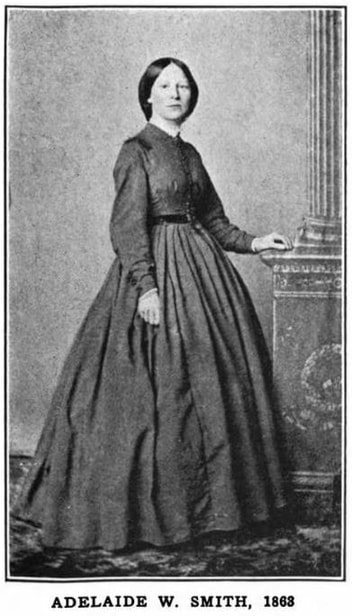
DEPOT FIELD HOSPITAL AND STATE AGENCIES AT CITY POINT, VIRGINIA
"THE hospital was situated half a mile from General Grant's headquarters at City Point, at the junction of the James and Appomatox Rivers, and about eight miles from Petersburg front. The hospital camp, then under the charge of Surgeon Edward Dalton and medical staff, was laid out with great precision. This field hospital was divided into the 9th, 2d, 6th, 5th corps, and corps d'Afric, and these again into divisions, avenues, and streets at right angles, — numbered and lettered. There were many thousands of sick and wounded in these wards, nine thousand or more at a time, I believe.
Convalescent soldiers did police, ward, nurse and kitchen duty. There were hundreds of wards with stockade sides, covered with canvas roofs upheld in the usual manner by ridge and tent poles, each containing probably fifty or more bunks or cots. A perfect system of order and policing by convalescent men was enforced, and not a particle of refuse or any scrap was allowed to lie for a moment upon the immaculate streets or avenues of the "Sacred Soil", which was generally beaten hard and dry, though in wet weather this was a problem to try men's souls and women's soles too. At such times we were obliged to wade through nearly a foot of liquid mud, occasionally sticking fast till pulled out somehow, perhaps with the loss of a high rubber boot."
"The wards were wonders of cleanliness, considering the disadvantages of field life, and even at that time sanitation was of a high order and, to a great degree, prevented local diseases. Men nurses, soldiers unfit for active duty, took pleasure in fixing up their wards with an attempt at ornamentation, when allowed. These men well deserved their pay, as they worked cheerfully for the government and for their sick comrades, doing their part faithfully during the devastations of war. They were as much needed and as necessary as their heroic comrades in the field. I never knew of one of these faithful, hard-working amateur nurses being guilty of neglect or unkindness, though chronic growlers and irritable sick men were often exasperating to the nurse's unfailing care and patience. They frequently conveyed some interdicted luxuries from the sutler, or extra rations, to make life more endurable and comfortable for the invalids. This was usually winked at by their officers. They were generally appreciated, and little dissatisfaction or complaint could have been expressed. Perfect discipline and sympathy seemed to prevail."
"During my year in this Field Hospital I did not hear of any enforcement of severe punishment, but I remember, one day, while riding outside of hospital lines, past a post or camp in the woods, seeing in the distance a poor fellow hanging by his thumbs to the branch of a tree. It was said by the men of his regiment that "the fellow ought to have been hanged."
"Just across the road on one side of the hospital was a row of State Agency tents. Larger tents of the Sanitary Commission, — that magnanimous gift of the people that so often, even in the far South, so nobly supplemented the regular hospital work and supplies, sometimes even with its own transports and its own official corps of workers, — headed this row. In the middle of the Agency row were the tents of the Christian Commission, supported chiefly by churches from all over the Northern States. They had built a large rough wooden structure where regular services were held on Sundays and on many evenings during the week, to the great relief and enjoyment of weary men seeking to find a word of hope and comfort, and a change from the monotony of ward life. Many ministers and other speakers came to look over the work, and many of them were very interesting and earnest.
Along this extensive row of tents were the Agencies, supported by the liberality of their several States, which also supplemented the government in giving special care to their own individual men. Capable men and refined women workers toiled uncomplainingly to make hospital life more endurable for the sick."
"From Petersburg front sick and wounded were daily sent to the hospital, often on rough flat sand cars, over badly laid shaking tracks, being brought as hastily as possible that they might receive proper care and help. The sight of these cars, loaded with sufferers as they lay piled like logs, waiting their turn to be carried to the wards, — powder-stained, dust-begrimed, in ragged torn and blood-stained uniforms, with here and there a half-severed limb dangling from a mutilated body, — was a gruesome, sickening one, never to be forgotten, and one which I tried not to see when unable to render assistance."
"Not only were the sick and wounded from near by brought there, but large numbers came from more southerly points of the army of the Potomac.Many seriously or permanently injured were sent here to wait until able to be forwarded to Washington. Some came en route on sick furloughs, or to be discharged, or when fit returned to their regiments in the field. Every grade of suffering or weariness found temporary shelter and care here. All incurable cases were hurried forward as soon as possible to make room for the multitude still coming."
"THE hospital was situated half a mile from General Grant's headquarters at City Point, at the junction of the James and Appomatox Rivers, and about eight miles from Petersburg front. The hospital camp, then under the charge of Surgeon Edward Dalton and medical staff, was laid out with great precision. This field hospital was divided into the 9th, 2d, 6th, 5th corps, and corps d'Afric, and these again into divisions, avenues, and streets at right angles, — numbered and lettered. There were many thousands of sick and wounded in these wards, nine thousand or more at a time, I believe.
Convalescent soldiers did police, ward, nurse and kitchen duty. There were hundreds of wards with stockade sides, covered with canvas roofs upheld in the usual manner by ridge and tent poles, each containing probably fifty or more bunks or cots. A perfect system of order and policing by convalescent men was enforced, and not a particle of refuse or any scrap was allowed to lie for a moment upon the immaculate streets or avenues of the "Sacred Soil", which was generally beaten hard and dry, though in wet weather this was a problem to try men's souls and women's soles too. At such times we were obliged to wade through nearly a foot of liquid mud, occasionally sticking fast till pulled out somehow, perhaps with the loss of a high rubber boot."
"The wards were wonders of cleanliness, considering the disadvantages of field life, and even at that time sanitation was of a high order and, to a great degree, prevented local diseases. Men nurses, soldiers unfit for active duty, took pleasure in fixing up their wards with an attempt at ornamentation, when allowed. These men well deserved their pay, as they worked cheerfully for the government and for their sick comrades, doing their part faithfully during the devastations of war. They were as much needed and as necessary as their heroic comrades in the field. I never knew of one of these faithful, hard-working amateur nurses being guilty of neglect or unkindness, though chronic growlers and irritable sick men were often exasperating to the nurse's unfailing care and patience. They frequently conveyed some interdicted luxuries from the sutler, or extra rations, to make life more endurable and comfortable for the invalids. This was usually winked at by their officers. They were generally appreciated, and little dissatisfaction or complaint could have been expressed. Perfect discipline and sympathy seemed to prevail."
"During my year in this Field Hospital I did not hear of any enforcement of severe punishment, but I remember, one day, while riding outside of hospital lines, past a post or camp in the woods, seeing in the distance a poor fellow hanging by his thumbs to the branch of a tree. It was said by the men of his regiment that "the fellow ought to have been hanged."
"Just across the road on one side of the hospital was a row of State Agency tents. Larger tents of the Sanitary Commission, — that magnanimous gift of the people that so often, even in the far South, so nobly supplemented the regular hospital work and supplies, sometimes even with its own transports and its own official corps of workers, — headed this row. In the middle of the Agency row were the tents of the Christian Commission, supported chiefly by churches from all over the Northern States. They had built a large rough wooden structure where regular services were held on Sundays and on many evenings during the week, to the great relief and enjoyment of weary men seeking to find a word of hope and comfort, and a change from the monotony of ward life. Many ministers and other speakers came to look over the work, and many of them were very interesting and earnest.
Along this extensive row of tents were the Agencies, supported by the liberality of their several States, which also supplemented the government in giving special care to their own individual men. Capable men and refined women workers toiled uncomplainingly to make hospital life more endurable for the sick."
"From Petersburg front sick and wounded were daily sent to the hospital, often on rough flat sand cars, over badly laid shaking tracks, being brought as hastily as possible that they might receive proper care and help. The sight of these cars, loaded with sufferers as they lay piled like logs, waiting their turn to be carried to the wards, — powder-stained, dust-begrimed, in ragged torn and blood-stained uniforms, with here and there a half-severed limb dangling from a mutilated body, — was a gruesome, sickening one, never to be forgotten, and one which I tried not to see when unable to render assistance."
"Not only were the sick and wounded from near by brought there, but large numbers came from more southerly points of the army of the Potomac.Many seriously or permanently injured were sent here to wait until able to be forwarded to Washington. Some came en route on sick furloughs, or to be discharged, or when fit returned to their regiments in the field. Every grade of suffering or weariness found temporary shelter and care here. All incurable cases were hurried forward as soon as possible to make room for the multitude still coming."

